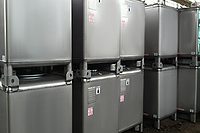Outsourcing Your Manufacturing? 10 Questions to Ask First

As the economy recovers and product demand begins to rise, coatings manufacturers are faced with a dilemma: Either increase in-house capacity and resources to meet demand or outsource production to a contract manufacturer. The contract manufacturing option is often the fastest strategy to efficiently meet business demands - if you find the right partner. Before you enter into a contract manufacturing agreement, be sure to ask yourself and your potential partner these important questions
1. Is outsourcing the right business strategy?
As time management guru Alan Lakein said, “Failing to plan is planning to fail,” so it is important to be clear about how outsourcing will meet your short- and long-term goals. Have an honest discussion with your manufacturing partner about your vision. This includes current demand, long-term volume projections, and new business growth opportunities.
Be as transparent as possible. Contract manufacturing arrangements work best when both parties are trusted partners and the contractor is an integral part of your business operations instead of an "order taker." Once you have a true partnership, the contractor will be in a better position to be supportive, flexible, and empathetic through challenges or growing pains. Synergy between you and your contractor will allow both parties to adapt to changes ranging from economic and supply chain factors to shifting consumer demands and technology advancements.
2. What price will produce your required profit?
Look beyond the price of the product and focus instead on the total value of the arrangement. Outsourcing can reduce your total costs - as well as your risk - by decreasing your direct costs for labor, raw material procurement, overhead, waste management, inventory, quality control, and capex items such as equipment and production facilities.
Be honest about your profit goals and expect the contract manufacturer to do the same. Remember that the quality of raw materials and manufacturing processes needed to meet QC specifications will not only impact the quality of the finished product, they will also affect cost, so consider the significant tradeoffs to a price target that is low.
3. Do you need research and development assistance or strictly toll producing for an existing recipe? Is the answer the same for your short- and long-term growth strategies?
Contract manufacturers that offer R&D in addition to manufacturing services provide significant value, especially if your product formulation needs additional properties or tweaks, or if your mature product needs a differentiation characteristic to inspire increased sales. Consider the case of one of our long-term partnerships in which we contract-manufacture a clear top finish for flexible vinyl used for tents and architectural structures. After several years, the company had begun to receive complaints of mold growth on the product in certain environments. As a contract manufacturer with deep chemistry and engineering expertise, we were able to incorporate a unique anti-microbial additive and modify the original formula to solve this performance issue while staying within the price target. This is a great example of a true partnership and adapting to challenges to succeed together.
4. What does the Non-Disclosure Agreement cover?
Not all NDAs are created equal and they can be difficult to understand. The best NDAs are “two-way” NDAs that fully protect both companies. Either the coatings marketer or the contract manufacturer can produce the NDA, which is a key document to establish a mutually beneficial relationship for the long haul. According to Mark. A Watkins, Esq., Partner with Vorys, Sater, Seymour and Pease LLP in Akron, Ohio, the NDA should define its purpose or subject matter as well as define how confidential information is exchanged (either unilaterally from the disclosing party to the receiving party or mutually between both parties) and whether that exchange is written, verbal or visual. Be clear in the NDA about who will own any new inventions that might result from the exchange of confidential information as well as any non-compete requirements. NDAs must be signed by authorized company representatives for it be legally binding.
5. Who will be sourcing, buying and inventorying the raw materials and packaging?
The answer to this question plays a major role in the price target discussed earlier. Are you looking for a complete turn-key operation from your contract manufacturer or would you like to handle some or all the ingredient sourcing, ordering and inventory management yourself? Before outsourcing this function to your contract manufacturer, see what type of buying options they are comfortable with. Also, check to make sure they have a dedicated team and assigned sales representative who will make sure materials arrive on time prior to batch production.
6. What is the contract manufacturer's standard lead time and how often are orders ready on time?
Lead time commitments are imperative to running a successful business operation. Unfortunately, this question is sometimes overlooked until it is too late. Your contract manufacturer should be able to commit to a standard lead time and continually track on-time and late orders. If an order is late, they should track the reason so they can learn and fix any reoccurring issues. Strive for a minimum on-time delivery rate of 90 percent.
7. What can I expect in the way of manufacturer communication?
There are many circumstances where consistent and clear communication is critical. Don’t forget to ask how often you will be communicated with about your order status, production and shipping timelines, payment due dates and other terms. Know who to contact with questions. Ideally, the contract manufacturer will provide direct communications access to multiple staff members including a technical sales representative, customer service representative and chemist so you can get your questions answered as quickly as possible.
8. What are your requirements for Quality Control and how will a prospective contract manufacturer fulfill this?
Most coating formulations require a standard range of QC specifications such as gloss, viscosity, color, particle size, etc. Does your formulation require a unique criterion that needs to be measured in every batch? You should clearly outline all required testing and quality checks for each formulation. Determine the formal quality standards, such as ISO 9001, and the industry-specific standards to which the contract manufacturer complies and ask if they will conduct additional testing as needed. Look for a partner that customizes their approach for each customer and that tests and records all standard and additional specifications required. They should also inventory retain samples of each production batch for future reference if needed.
9. What are your shipping options?
It is essential to learn what your options are for shipping your products efficiently, at the right time and at the lowest cost. Identify domestic and international product delivery destinations and how shipping will be invoiced. If the product's formulation contains hazardous materials, the contract manufacturer's regulatory team will need early access to its Safety Data Sheet to ensure seamless shipping and compliance. Make special note if your products will be shipped to one warehouse or drop shipped to multiple locations. Look for a contract manufacturer whose regulatory and shipping departments can help ensure products arrive efficiently and as quickly as needed.
10. What happens to production in the event of a natural disaster or a government shutdown?
Fires, natural disasters or other unexpected events can be detrimental to fulfilling production. When making the decision to outsource your manufacturing needs, reliability is key. A secure plan in place to follow when the unfortunate happens is critical to long-term success. Is your contract manufacturer considered an essential business that is able to service a variety of key industries in the country and globally? Does it have redundant manufacturing facilities to sustain production in the event of a disaster? The recent COVID-19 pandemic and its impact on business continuity should provide a lesson to learn.
Turning to a contract manufacturer can help your business reap multiple advantages, both in the short- or long-term. Doing your homework up-front will help to ensure a successful partnership moving forward.
Looking for a reprint of this article?
From high-res PDFs to custom plaques, order your copy today!








